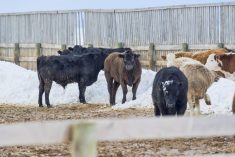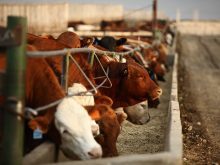Chicago | Reuters — Live cattle futures on the Chicago Mercantile Exchange ended lower on Friday in a profit-taking setback from two-month highs amid worries about inflation curbing consumer demand for beef, traders said.
Larger-than-expected numbers of U.S. cattle on feed announced by the U.S. Department of Agriculture after the CME close could pressure futures on Monday.
CME June live cattle futures fell 1.475 cents on Friday to settle at 138.425 cents/lb., turning down after rising in early moves to 140 cents, the contract’s highest since Feb. 24 (all figures US$).
Read Also

Ukraine wheat exports remain low amid Russian attacks on ports, weak demand
Ukraine’s wheat exports remained relatively low in the first half of January amid Russian attacks on Ukrainian seaports and low external demand, data from the country’s grain traders union UGA showed on Wednesday.
CME feeder cattle ended mixed, with May down 0.975 cent at 163.875 cents/lb. and most-active August feeders up 0.450 cent at 176.9 cents/lb.
Higher cash cattle prices buoyed futures this week, but concerns about inflation pressured the market on Friday as Wall Street equity markets tumbled.
Wholesale beef prices have been falling since mid-April, possibly due to cold weather slowing the start of the U.S. grilling season, said Altin Kalo, economist at Steiner Consulting Group.
“People have not really gotten started with grilling yet. And then you have the demand effects from higher inflation and gas prices. High-dollar items such as beef tend to not fare very well,” Kalo said.
After the close, USDA reported the number of U.S. cattle on feed as of April 1 at 12.1 million head, up two per cent from a year earlier, while analysts surveyed by Reuters on average expected a smaller increase of only 0.4 per cent.
The government said cattle placements in feedlots during March were roughly steady with a year ago, while analysts on average expected a 7.8 per cent decline.
“It’s a bearish report,” Kalo said of the larger-than-expected numbers.
In its monthly Cold Storage report, USDA said U.S. frozen beef supplies totaled 536.887 million lbs. at the end of last month, an all-time high for March.
Frozen pork supplies were up eight per cent from last year, USDA said.
CME lean hog futures closed higher, snapping a three-session slide as traders covered short positions ahead of the weekend. Benchmark June lean hogs settled up 1.6 cents at 118.775 cents/lb.
— Julie Ingwersen is a Reuters commodities correspondent in Chicago.


















